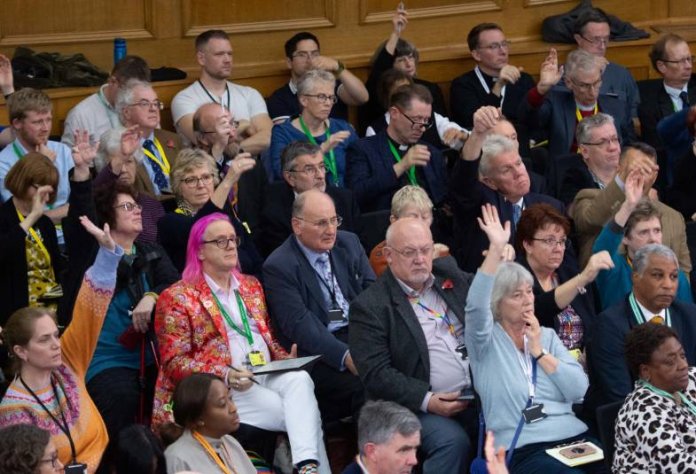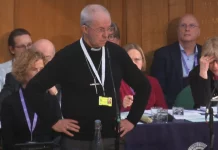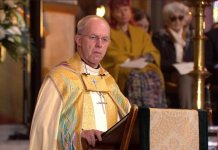In October 2021, Anglican Futures predicted that the House of Bishops would seek to introduce experimental services to bless same-sex relationships in February 2023. Most dismissed it as fanciful, yet despite events unfolding in a slightly different order, by the end of 2023, approved blessings are taking place and standalone services may well be introduced on an experimental basis early in 2024.
For many this has come as a shock.
This, the 75th and last Anglican Futures’ blog post of 2023, offers a review of the other 74 posts, exploring four themes to help faithful Anglicans as they prepare for 2024.
1. Honesty about the extent of the problem
A little-read blog in April, “The final block”, looked to the game of Jenga to understand what is happening:
“Thousands of pages have been written to explain how those who accept the blessing of same-sex relationships have already turned away from what Christians have always believed about many foundational ideas; the nature of men and women, marriage, creation and procreation; how we define sin and what we need saving from; the nature and authority of the Scriptures; and even our understanding of the Triune God. But these are the doctrinal ‘blocks’ which have been quietly removed and replaced over many years, often without much comment from evangelicals.
The question is what can the bishops do now? They have identified and begun to move the ‘block’ marked ‘blessing those in same-sex relationships’ – and many have greeted its removal with cheers and celebrations. Others have become aware of the instability of the superstructure and are “compelled to resist,” in case it causes the whole fabric to collapse.”
During the year, the instability of that superstructure became more obvious, as can be seen by these summaries of each of the three General Synod meetings:
In February, the House of Bishops used their power to drive through their agenda
“And so it seems, if nothing else, what is over is any effective further synodical scrutiny and trust in the House of Bishops.”
In July, the lack of trust showed itself in debates about safeguarding and the progress of the Prayers of Love and Faith, as can be seen in these twenty-four snippets from the floor of Synod.
In November, the curtain was raised on what has been going on for decades – with senior clergy admitting they have already been blessing same-sex relationships with the knowledge of their bishops.
At November’s General Synod, Benjamin John’asked the Archbishop of Canterbury a simple question – “What do bishops actually have to believe?, showed just how shaky things are:
“I refer to the answer I gave last time with the emphasis that the faith is proclaimed ‘afresh in each generation’ and ‘Led by the Holy Spirit’.”
Such a scornful answer may go down well in a sixth-form debating society but it is unbecoming for the Primate of the Mother Church of the Anglican Communion. It is defensive, disparaging and more worryingly spiritually inane – but sadly we have no reason to believe that it is not honest.
In responding in this way, the Archbishop of Canterbury shows he has no interest in the historic formularies or the theology which they contain – he sees no reason to explain how the changes he is introducing are rooted in his understanding of the Holy Trinity, the Holy Scriptures or the catholic creeds –and no desire to justify how they fit within Anglican tradition. Instead, he emphasises two phrases, which when ripped from that context are entirely subjective and therefore meaningless.
And that is the problem.
The Archbishop of Canterbury’s real emphasis is to use the power that he has to get his LLF project through Synod – and to achieve it he will celebrate “uncertainty” and create all manner of “fresh” understandings of doctrines and pastoral practice, as long as they are more acceptable to the current “generation”, and all the while he will claim the blessing of the Holy Spirit.”
And the Archbishop of Canterbury is not alone, it seems that the majority of bishops in the Church of England are determined to drive through an innovation which strikes at the heart of the global and historical understanding of the Christian faith, as was seen in the most recent blog “Is repentance necessary?”
“Booth, Bonhoeffer, Ovey, and more recently Archbishop Samy Fawzy, Archbishop of Alexandria and Benjamin John, have all sounded the warning trumpet – but unfortunately few have been listening.
All false teaching has catastrophic salvific consequences and they are also, inevitably, attended by disastrous pastoral consequences.”
The introduction of Prayers of Love and Faith cannot be dismissed as a storm in a teacup:
“What is clearly going on is that, contrary to all their protestations, the House of Bishops are sending a message to the country that the Church of England has changed its understanding on issues of human sexuality. And, to them at least, if that is the prize, the suffering of others, the rejection by the global church and the internal fragmentation is a price worth paying.”
2. Honesty about the options available
After November’s Synod “The Day the Music Died”, reflected the grief felt by many in the Church of England and it is unsurprising that in their heartache people have clung onto any hope offered.
As the impossibility of a Third Province (even for the faithful) became more obvious, other forms of ‘Formal Structural Pastoral Provision” were suggested. To assist people as they considered the pros and cons of the options being bandied around, Anglican Futures explored a number of Anglican Myths:
Anglican Myth 1: It’s my church – I’m the incumbent
Anglican Myth 2: “But can’t we have “Alternative Episcopal Oversight”?
Anglican Myth 3: The bishop is the focus of unity
Anglican Myth 4: We can bankrupt the diocese
Anglican Myth 5: St Luke’s is leaving the Church of England
Anglican Myth 6: The louder the better
Anglican Myth 7: The temporal-spiritual divide
Anglican Myth 8: Overseas bishops will be the answer
Transparency is vital if people are to make good decisions about their futures and it is important that people understand what shadow structures can, and can’t, offer.
Anglican Futures sought such transparency, in a blog outlining one possible solution for faithful Anglicans within the Church of England. NoGeoDoCE – a Non-Geographical Diocese in the Church of England, which is modelled on the semi-independence of the Crown dependencies, however,
“As said before, NoGeoDoCE, is far from perfect and doubtless can be much improved. Publication of this blog is not a suggestion that Anglican Futures believes NoGeoDoCE is the proper course, or even that it will work. Neither is it a criticism of CEEC, who have been working hard to support faithful Anglicans in the Church of England.
But as an organisation, Anglican Futures is willing to do what it can to help those committed to remaining in the Church of England find the best possible provision. To that end NoGeoDoCE is offered as a starting point, with Anglican Futures accepting the inevitable criticism and allowing others to do better. The prayer is that this blog will stimulate the necessary debate to enable proactive engagement with the House of Bishops, General Synod and orthodox congregations, before it is too late.”
It will be interesting to see if there is any formal engagement with this option.
Yet, perhaps the most important thing for faithful Anglicans to consider is the nature of the debate that is taking place. A debate which has been master-minded by David Porter, who has been the Archbishop of Canterbury’s right-hand man
“What many have not understood is that the genius of David Porter’s approach to reconciliation is that the process is the outcome. It is like a giant travelator – step on and the destination is fixed. And in David Porter’s own words, that destination is “compromise”. Once you are on it, just like a travelator, there is no alternative route – getting off is difficult, potentially dangerous and comes with the threat of being deemed disloyal/ fractious – so most stay on.”
3. Humility about the decisions we take
Aware of the difficult decisions facing faithful Anglicans in the year ahead, Anglican Futures began 2023 with an impassioned plea for clergy and laity to be like Daniel by considering the compromises which are part of living in a fallen world.
“Daniel resolved in his heart in advance what it was he would and would not do. In other words he was honest with himself about what he was doing and what was, and was not, acceptable. That is surely a good discipline – not to fall into compromise but to take reasoned decisions, justified by the exigencies of the situation, but always aware that doing so is somewhere between sub-optimal and a necessary evil.
In a similar vein, a series of blogs over the summer considered the different pressures facing laity and clergy and sought to offer practical help whatever decision people come to:
I’m Just A Layperson 1: Understanding
I’m Just a Layperson 2: Calling and Conscience
I’m Just a Layperson 3: “I’m not sure I can stay…”
I’m Just a Layperson 4: We are agreed – we need to stay
I’m Just a Layperson 5: “My vicar wants to leave but I don’t.”
I’m Just a Layperson 6: “We are agreed – we need to leave.”
As the very first Anglican Futures blog said,
“…the great test facing this generation is not getting the “right” answer to, “should I stay or should I go” but the holiness with which we treat those who come to the opposite conclusion. The real question, therefore, is, “How am I holy in this?”…”
4. Humilty in relationships – locally and globally
On the eve of Gafcon IV in Kigali, the Anglican Futures blog set a somewhat controversial challenge to delgates.
“To lay aside English exceptionalism, with its backchannels and secret deals, to concede that the rest of the world largely does a better job of running their Provinces and to surrender an assumed right to lead, by dint of birth, will be very hard….
… There is much talk of “Global Anglican Re-alignment”, the challenge for the English Anglicans going to the Global Anglican Futures Conference is to have hearts realigned to be the servants of all and master of none.”
One person who embodies such humility is Bishop Keith Sinclair, who spoke powerfully at Gafcon IV and was honoured by the gathered crowd.
“The genuine gratitude for Bishop Keith’s steadfast commitment to the unity found in the truth of God’s word was shown by those at Gafcon IV. It could be felt in the warmth of the applause and the spontaneous signs of affection. If Archbishop Ben Kwashi had not led Bishop Keith off the stage, lunch would have had to be delayed – and no one would have minded – such was the desire to ‘honour’ this man.”
Similarly, much can be learned from the experience of those in New Zealand both in how to manage relationships globally and locally. As Bishop Jay Behan has said:
“One of the principles I speak about a lot that guided us in our decision-making process was “not just us, not just now”. This was important so we were not just making decisions for us or that worked only in the present. Our decisions were guided by what others need and by what will last. Remaining Anglican was, in part, not because it is the only way, but because of the proven capacity to last over 500 years regardless of personalities.”
Humility will be even more important now that both Gafcon and the Global South Fellowship of Anglicans have committed to resetting the Anglican Communion, without reference to the traditional Instruments of Unity, in which they have “no confidence.”
Looking ahead
2023 has revealed the theological instability of the Church of England and experience tells us it will take honesty and humility for faithful Anglicans to determine the best way forward. Whatever happens in 2024, Anglican Futures will continue to offer practical and pastoral support to those who seek it.










